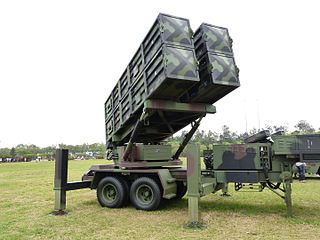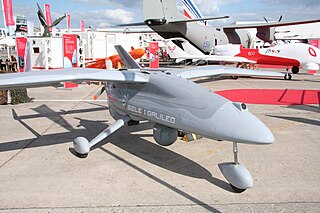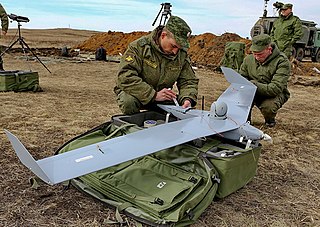
Cardinal is a family of small unmanned aerial vehicles made by the National Chung-Shan Institute of Science and Technology (NCSIST).

Cardinal is a family of small unmanned aerial vehicles made by the National Chung-Shan Institute of Science and Technology (NCSIST).
The Cardinal I was the initial prototype of the Cardinal. [1]
The Cardinal II began development in 2009 and is based on the Cardinal I but has a better payload design, digital data link, and automatic tracking antenna system. It was exhibited at the 2015 Paris Air Show. In service with Republic of China Marine Corps [2] and Republic of China Army. [3] Other than military missions the Cardinal II can be used for civil remote sensing and disaster relief missions. [4]
The Taiwanese Navy procured 54 aircraft in 2016. [5]
The components of a Cardinal II system are the aircraft, an antenna, and a ground control box. The Cardinal II is hand launched and recovered by parachute. The aircraft is equipped with an autopilot and can transmit data and imagery in real time. [4] The remote control flight range is 8km. [6] In service a Taiwanese Cardinal II unit has six primary aircraft and three backups. [5]
Cardinal III features vertical takeoff and landing capabilities. It is reportedly optimized for coastal surveillance. [7] It is intended for operation by the Marine Corps. [8] It was displayed at the Taipei Aerospace & Defense Technology Exhibition in 2023. [9]
In 2019 NCSIST exhibited the Fire Cardinal for the first time at the Taipei Aerospace & Defense Technology Exhibition. It was referred to by NCSIST as an "air-to-ground assault" UAV, what is more commonly known as a loitering munition. [10] The Fire Cardinal is a twin-propeller drone about four feet long with a six-foot wingspan. It weighs around 15 pounds and includes an electro-optical and infrared sensor as well as advanced target discrimination systems. [11]
General characteristics
Performance

An unmanned aerial vehicle (UAV), commonly known as a drone, is an aircraft without any human pilot, crew, or passengers on board. UAVs were originally developed through the twentieth century for military missions too "dull, dirty or dangerous" for humans, and by the twenty-first, they had become essential assets to most militaries. As control technologies improved and costs fell, their use expanded to many non-military applications. These include aerial photography, area coverage, precision agriculture, forest fire monitoring, river monitoring, environmental monitoring, policing and surveillance, infrastructure inspections, smuggling, product deliveries, entertainment, and drone racing.

The Sky Sword II, or TC-2, is a Taiwanese beyond-visual-range air-to-air missile. It has an inertial navigation system, a data-link for mid-course guidance and active radar homing for terminal guidance, beyond visual range. It also has ECCM capability and can engage multiple targets. According to Su Tzu-yun, chief executive officer at the Center for Advanced Technology at Tamkang University, they are a cost-effective design which can perform a key role in Taiwan's defense strategy, and substantially offset China's air superiority. Some details of its design were revealed for the first time at the Paris Air Show in 2015. The pulse doppler radar seeker reportedly has a detection range of 9.3 km (5.8 mi).

National Chung-Shan Institute of Science and Technology is a Taiwanese state owned corporation, formerly part of the Ministry of National Defense's Armaments Bureau, which is active in the development, manufacturing, support, and sustainment of various weapons systems and dual use technologies.

The CM-32 "Clouded Leopard", officially Taiwan Infantry Fighting Vehicle (TIFV), is an eight-wheeled armoured vehicle currently being produced for the Republic of China Army. It is based on the 6x6 CM-31 designed by Timoney Technology Limited of Ireland and is further developed by the Ordnance Readiness Development Center.

The TAI Anka is a family of unmanned aerial vehicles developed by Turkish Aerospace Industries primarily for the Turkish Air Force. Envisioned in the early 2000s for aerial surveillance and reconnaissance missions, Anka has evolved into a modular platform with synthetic-aperture radar, precise weapons and satellite communication.

The IAI Eitan is an unmanned reconnaissance aircraft developed in Israel in the early 21st century by the Malat division of Israel Aerospace Industries. The aircraft is a newer version of the IAI Heron. Along with intelligence, surveillance, target acquisition, and reconnaissance (ISTR), Israeli IAI Eitan also capable of holding armed roles. There are conflicting reports on whether the exported Eitan's are unarmed or armed.

The Falco is a tactical unmanned aerial vehicle (UAV) designed and produced by Selex ES. The UAV is designed to be a medium-altitude, medium-endurance surveillance platform capable of carrying a range of payloads, including several types of high-resolution sensors. A larger variant, the Falco EVO, is capable of carrying larger payloads is also available. Neither system is designed to carry weapons, The launch customer, Pakistan, reportedly wanted the Falco armed, a request that Italy rejected.

IAI Bird-Eye is a family of mini-UAVs developed by Israel Aerospace Industries (IAI) Malat division. Designed for military and paramilitary intelligence, surveillance and reconnaissance missions.

The AeroVironment T-20 unmanned aerial vehicle (UAV) is a medium range, composite aircraft capable of internal and external payloads. Launched from a portable catapult, it can be recovered with a shipboard landing system, or belly land on unimproved surfaces. The T-20 carries a retractable gimbal-mounted, digitally stabilized, electro-optical/infrared (EO/IR) camera that relays video in real time via a C-band LOS data link to the ground control station (GCS). Powered by a 4-stroke, fuel injected gasoline engine, the aircraft burns 2 lb (910 g) of fuel per hour at cruise. AeroVironment, Inc. acquired Arcturus UAV, the original developer of JUMP 20 and T-20 on February 22, 2021.

The Tuo Chiang-class corvette is a Taiwanese-designed class of fast and stealthy multi-mission corvettes built for the Republic of China (Taiwan) Navy. It is designed to counter the numerous and increasingly sophisticated People's Liberation Army Navy ships by utilizing hit-and-run tactics, and thus features clean upper structure design with very few extrusions to reduce radar signature, pre-cooled engine exhaust to reduce infrared signature, and a reduced visual signature to reduce chance of detection.

CASC Rainbow, abbreviated as CH, is a series of unmanned aerial vehicles (UAVs) developed by the China Academy of Aerospace Aerodynamics within the China Aerospace Science and Technology Corporation (CASC), also known as the 11th Academy of CASC or 701st Research Institute.

The AIDC T-5 Brave Eagle is a transonic advanced jet trainer and light attack aircraft developed by the Aerospace Industrial Development Corporation (AIDC) of Taiwan.

Lungteh Shipbuilding is a Taiwanese ship and boat builder headquartered in Yilan County.

The Kestrel is an individual shoulder-launched weapon system developed by Taiwan's National Chung-Shan Institute of Science and Technology and currently in service with the Republic of China Armed Forces and Coast Guard Administration.
The Taipei Aerospace & Defense Technology Exhibition is a biennial defense exhibition held in Taiwan.

The NCSIST Chien Hsiang is a Taiwanese anti-radiation loitering munition developed and produced by the National Chung-Shan Institute of Science and Technology.

The defense industry of Taiwan is a strategically important sector and a significant employer. They primarily supply weapons and platforms to the Republic of China Armed Forces with few major weapons systems exported abroad. Taiwanese defense industry has produced fighter aircraft, missile systems, surface ships, radars, rocket artillery, armored vehicles, and small arms.

The Albatross(Chinese: 銳鳶; pinyin: Ruì yuān,“Sharp Kite”), also known as the Chung Xiang II, is a medium unmanned aerial vehicle made by National Chung-Shan Institute of Science and Technology. It is in service with the Republic of China Navy.

The Teng Yun is a UAV under development by the National Chung-Shan Institute of Science and Technology (NCSIST) of Taiwan. It was said to be able to carry armaments to conduct combat missions.